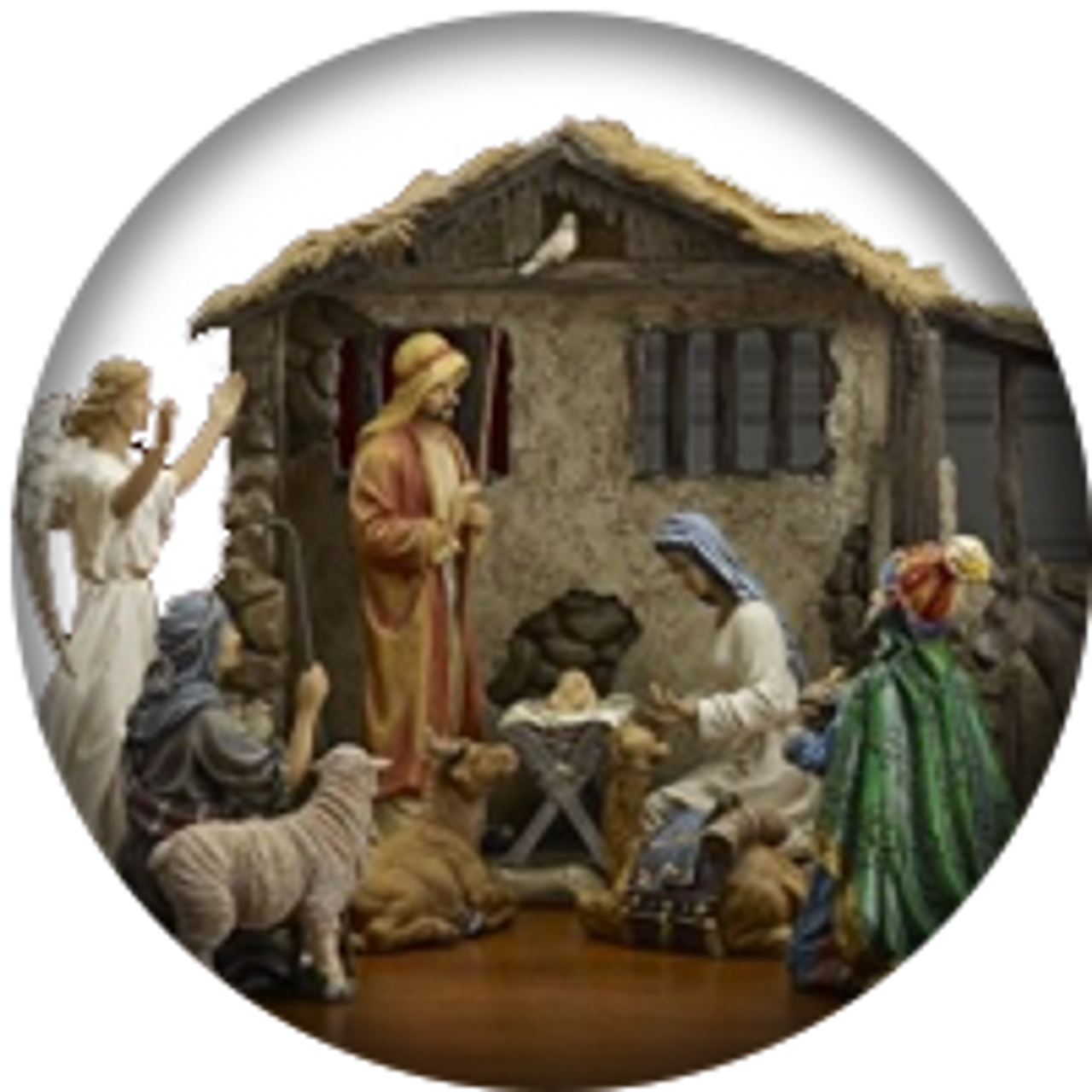PART III: ST. PIO POSTSCRIPT
Kathy Boh on 18th Sep 2019
PART III: ST. PIO POSTSCRIPT
This month of September is a good time to look again at the life, dedication and suffering of St. Pio, whose feast day is on September 23rd. We have done that in Parts I and II on Padre Pio’s life. Part I, II and III were published last fall, in 2018, which was the 100th anniversary of St. Pio’s stigmata, and the 50th anniversary of his prayer group ministry.
Last fall also ushered in some news stories that made many Catholics and Christians ask unforeseen questions about church life. Throughout this past year, we continue to face the need for much prayer in our churches. Some are opening their eyes and their ears and their hearts as they pay attention to both warnings and encouragements from the Lord.
JESUS AND PADRE PIO
This "POSTSCRIPT" is a follow-up to "PART II", which included a warning vision given to Padre Pio. It was an exhortation to priests and ministers from Jesus, Who presented Himself as still suffering--even "now". Padre Pio then shared and "helped carry" Jesus' modern-day cross.
Padre Pio tasted of Jesus’ Passion for the sake of his fellow priests, as Jesus showed him with words and in a vision (described in Part II). This was just one of the ways that he shared in the Lord’s burden of care for his brothers and their calling. Then—throughout the pain and sufferings of his stigmata and other troubles he endured—he continued to care for God’s people as much as possible, even establishing prayer groups around the world. As Padre Pio took it upon himself to answer the call of Jesus to share His loving concern for His sheep and their shepherds, we now take a look at some of the ways Jesus voiced that concern and care.
A PRIEST AND A SHEPHERD
No matter what title in the hierarchy of the church a priest attains, he is also, first of all, a priest. This has been reiterated by more than one pope. It was encouraging and meaningful to many of us when we heard and saw that Pope Francis chose a shepherd and his sheep as the scene depicted on his pectoral, papal cross.
Jesus, Himself, has said:
11 “I am the good shepherd; the good shepherd lays down His life for the sheep.12 He who is a hired hand, and not a shepherd, who is not the owner of the sheep, sees the wolf coming, and leaves the sheep and flees, and the wolf snatches them and scatters them. 13 He flees because he is a hired hand and is not concerned about the sheep. 14 I am the good shepherd, and I know My own and My own know Me, just as the Father knows me and I know the Father; and I will lay down my life for the sheep. I have other sheep that do not belong to this fold. These also I must lead, and they will hear my voice…” [Jn 10:11-16a]
This shows the passionately loving heart of the Lord God towards His people, His flock. It continually strikes me that we must remember to whom these sheep belong. They do not belong to us. They are not ours. They belong to God Himself. They belong to Jesus the Good Shepherd. Those who do care for His sheep on earth are His "under-shepherds" . And He never wants them to be, or wants them to see themselves as, "hired hands." The Good Shepherd's words are deeply meaningful instruction for each and every of us who in any way handle, serve or relate to God’s people.
TODAY’S HEADLINES: WHERE TO FOCUS?
In today’s headlines and in Catholic news, we are hearing about current 21st century issues and (unresolved) 20th century issues and matters of concern to both clergy and laity alike. Some disconcerting events and facts continue to come to sorrowful light that require God’s powerful truth and His holy light shed deeply upon them. Current church leaders need our prayers and Holy Spirit guidance in facing serious matters of concern for the flock that they are called to care for, feed, and tend… tenderly, as Jesus called us to do.
HEARING GOD’S WORD
Considering what is going on around us, and what we are hearing in the news, this may be the best time to honor St. Pio’s great suffering—and Our Lord’s immeasurably greater suffering. (Part II of this series on St. Pio looked into his callings and apparitions, along with the Vatican investigation into his ministry. It described his burden for other priests, and his call to initiate intercessory prayer groups.) Here, we continue to take a larger look at what Jesus has said—both to Padre Pio and directly to all of us, in His own words, in the Bible.
Some of us have spent many years being exposed to scriptures we have heard in church. Human nature being what it is, we can grow too accustomed to hearing some things (and not others) and sometimes stop listening or grow “deaf”. So—let’s take a moment to look at some things again.
Considering human nature, it is not surprising that we often tend to embrace the words and messages that we prefer. Especially those words that “feel good”. Likewise, we tend to sift out or ignore the many warnings and less appealing instruction we receive. Padre Pio received a warning from Jesus in the form of a vision. He took it in, shared it, and suffered for it.
Times and seasons change, and (to use the student-in-the-school-of-life analogy), we recognize that: Test times DO come… wanted or unwanted, sought or avoided, ready or not… The truth that we have or have not taken in and assimilated— in thought, word and deed—will eventually become evident. Opportunities will present themselves… Life is like that.
HIDDEN THINGS
One thing that we are hearing and seeing is this: Hidden things are coming to light. This reminds me of a scripture.
Jesus said, “What you have said in the dark… will be proclaimed from the housetops…” [Luke 12:3 NASB] Or, to clarify and expand on the verse:
“Whatever you have spoken in the darkness shall be heard and listened to in the light, and what you have whispered in [people’s] ears and behind closed doors will be proclaimed upon the housetops.” [AMPC]
The epistle to the Corinthians also speaks to this:
“… the Lord comes who will both bring to light the things hidden in the darkness and disclose the motives of men’s hearts, and then each man’s praise will come to him from God.” [1Cor 4:5 NASB]
2 Cor 4:2 speaks even further regarding evil hidden things. This time we will go straight to the Amplified version. (The Amplified version explains the meaning of the original Greek, Hebrew and Aramaic words and phrases, to help us further understand what is being said.):
“We have renounced disgraceful ways (secret thoughts, feelings, desires and underhandedness, the methods and arts that men hide through shame); we refuse to deal craftily (to practice trickery and cunning) or to adulterate or handle dishonestly the Word of God, but we state the truth openly (clearly and candidly). And so we commend ourselves in the sight and presence of God to every man’s conscience.” [AMPC]
And, we note that throughout Christian and Catholic history and theology, it is a well-formed and rightly formed conscience that God desires. it is one that is formed by the Way, the Truth, the Life and the Light of Jesus Christ, if we are to call ourselves either Christians or Catholics.
And then, again, we print the NASB version:
“We have renounced the things hidden because of shame, not walking in craftiness or adulterating the word of God, but by the manifestation of truth commending ourselves to every man’s conscience in the sight of God.”
GO TO THE SOURCE
We just spoke of “hidden things” and “conscience”. Let’s look at “conscience” for a moment. Vatican II was the Council that Pope John XXIII felt led by the Holy Spirit to call in the early 1960’s. Some have said that the openness to the “new things” that the Holy Spirit was leading became an openness to some things that were not led by the Holy Spirit. Some have seen that being led by “conscience” no longer meant that it was, necessarily, a “well-formed” conscience, formed by the word of God, right teaching and God’s Spirit leading us. Some unhealthy “patterns”… some “open doors” may be traced back to times even before that. It is easy to simply copy the “world’s ways” and not God’s ways and thoughts. Instead, Jesus taught us to live and be in the world—as a light/Light—but not of it [not imitating and absorbing its perspectives and ways, priorities and behaviors].
Whatever has happened, and however we as God’s people have “evolved” in our thinking and perspectives, it may be imperative that we begin at the Source. We may need to ask ourselves some of the most basic questions—for it is easy to lose sight of the basics as lives and cultures becomes more demanding, confusing and complicated. But even amid complications —when applying the truth becomes less easy to discern—we cannot risk losing sight of the truth… or stop calling truth “truth”, or—much less—stop valuing it, believing it and seeking it—the “truth”… the Truth, as Jesus called Himself.
We mentioned beginning “at the Source”. An analogy comes to mind. For health’s sake, people have found that water that has its source in a mountain spring is purer—the source has not been compromised so much by outside contaminants. In a spiritual sense, we, too, find it helpful to go to our “Source”—Who also happens to be the “Way, the “Truth” and the “Life”.
As we write that, we recognize the fact: that endless powers and attributes are combined in One holy and endless Source. That Source is both incomprehensible and exceedingly amazing… and He is also quite true...True. So—whatever we do—we need to continually drink from our pure and Living Source—Jesus Christ, the living Word (made flesh) and deeply drink of His words in the scriptures.
FINDING ANSWERS AS PART OF GOD’S KINGDOM
When problems come that are complex… involving many people and many things… difficult to discern… we assume—as intelligent, presumedly mature, problem-solving adults—that we must reach hard into our own well-trained and educated thinking ability. That is necessarily involved. But Jesus might advise a different first step. We have heard scriptures saying things like: …. “Come unto Me”….”Take My yoke”… “Come as a child” before the Father…
“Amen, I say to you, unless you turn and become like children, you will not enter the kingdom of heaven. “ [Matt 18:4] Becoming like children is not what educated, adult, well-positioned people usually want to hear—particularly in a competitive, impress-one-another society like ours. But we continue:
And, again, giving the Amplified version:
3 " ...Truly I say to you, unless you repent (change, turn about) and become like little children [trusting, lowly, loving, forgiving], you can never enter the kingdom of heaven [at all]."
As God lives in us, and works through us, He graces us to go beyond what we can be on our own. This makes all the difference.
This is similar to, but much greater than, what a good parent does for his/her child. He or she is quite willing to make up the difference in what that 2-week-old—or 4-year-old or 11-year-old or 16-year old—can or cannot do, or do well enough on his/her own. The good father or mother desires to see that child well cared for and covered with love. God is our loving Father. It was always His intention to kindly direct and protect our lives, as we listen to and follow His lead.
THE KINGDOM OF GOD
In January, we did a four-part series (“Kings and Kingdoms”) on the Kingdom of God. While that series gives much more explanation, detail and connections, we will examine here some of the "kingdom of God" concept in scripture.
Jesus spoke of the “kingdom of God” (or God’s kingly rule over us both now and in the kingdom of heaven) many times in the gospels, even saying: “the kingdom of God is at hand” (near, close by, available).
“This is the time of fulfillment. The kingdom of God is at hand. Repent and believe in the gospel.” [Mk 1:15, NABRE]
And the expanded, Amplified version: “… The [appointed period of] time is fulfilled (completed), and the kingdom of God is at hand: Repent (have a change of mind which issues in regret for past sins and in change of conduct for the better) and believe (trust in, rely on, and adhere to) the good news (the Gospel). [AMPC]
That's a very plain, direct, clear and simple (not easy) call.
So receiving God’s reign over our lives involves a turning towards Him. Let’s look at some more of Matthew chapter 18—especially verses 5-7—where we hear Jesus speak again of “little ones”. This message fits well into our own day, and what affects Gods’ flock in following after Him. We will begin with the Amplified, and then give some comments from footnotes from the NABRE.
5 And whoever receives and accepts and welcomes one little child like this for My sake and in My name receives and accepts and welcomes Me.
6 But whoever causes one of these little ones who believe in and acknowledge and cleave to Me to stumble and sin [that is, who entices him or hinders him in right conduct or thought], it would be better (more expedient and profitable or advantageous) for him to have a great millstone fastened around his neck and to be sunk in the depth of the sea.
7 Woe to the world for such temptations to sin and influences to do wrong! It is necessary that temptations come, but woe to the person on whose account or by whom the temptation comes!”
The footnote on 18:6 in the NABRE says “…Since apart from this chapter the designation little ones occurs in Matthew only in 10:42 where it means disciples as such, that is its more likely meaning here. Who believe in me: since discipleship is impossible without at least some degree of faith, this… serves to indicate that the warning against causing a little one to sin is principally directed against whatever would lead such a one to a weakening or loss of faith…”
So, from this we understand that any disciple is included in this “little one” warning. This interpretation certainly fits into the concept of God the Father’s fatherly, protective perspective towards His children--of any age who seek to follow after Him as His disciple.
Summarizing, we have just recalled that God’s rule over us in His kingdom (as King of kings, Lord of lords, Lord of His church, Lord over all aspects of every follower's life, etc.) begins with the “good news”. When speaking of the Kingdom, our Savior said that it is “at hand”, for us (continually). As our King, He rules as “Savior”/ “the Way”/ “the Truth”/ “the Life”, etc. We then need to “trust in, rely on and adhere to” this “good news”. We need to follow the prayer that Jesus gave us, praying that His kingdom come (individually and corporately) "on earth as it is in heaven".
God sometimes has some unusual answers—even in our day. It reminds me of a famous example from King Solomon's life. Scripture speaks of the wisdom of Solomon. Few judges would have thought to use a sword to decide a dispute between two women—both claiming to be a baby’s mother. But by the Spirit of wisdom, the truth was discovered. Solomon offered to cut the baby in half, and the true mother who loved the child cried out against that. The other woman, in her own jealousy, wished to see the true mother suffer the same loss that she had. Even with God's unusual answers, the only sword recommended here is the sword of the Spirit, the word of God. [Eph 6:17]
THE LEAST OF THESE
We saw the passion with which Jesus spoke regarding “little ones”. Now let’s look at how He regarded the “least”. They, too, are part of the larger picture of living in the kingdom of God.
When we speak about serving others, we recall Jesus’ words about how to treat the least among us. We go to Mt. 34-40 [NABRE]
“…‘Come, you who are blessed by my Father. Inherit the kingdom prepared for you from the foundation of the world. 35 For I was hungry and you gave me food, I was thirsty and you gave me drink, a stranger and you welcomed me, 36 naked and you clothed me, ill and you cared for me, in prison and you visited me.’ 37 Then the righteous[will answer him and say, ‘Lord, when did we see you hungry and feed you, or thirsty and give you drink? 38 When did we see you a stranger and welcome you, or naked and clothe you? 39 When did we see you ill or in prison, and visit you?’ 40 And the king will say to them in reply, ‘Amen, I say to you, whatever you did for one of these least brothers of mine, you did for me.’”
The Amplified version clarifies: “least [in the estimation of men]”.[AMPC]
The TPT translation seems to catch the spirit of Jesus’ passionate love toward the overlooked and undervalued:
“And the King will answer them, ‘Don’t you know? When you cared for one of the least important of these my little ones, my true brothers and sisters, you demonstrated love for me.”
WHATSOEVER YOU DID NOT DO
Getting back to Matt. 41, we continue.
41 “Then He will also say to those on His left, ‘Depart from Me, accursed ones, into the eternal fire which has been prepared for the devil and his angels;
45 Then He will answer them, ‘Truly I say to you, to the extent that you did not do it to one of the least of these, you did not do it to Me.’46 These will go away into eternal punishment, but the righteous into eternal life.”[Mt. 25:41,45-46, NASB]
EXTERNAL RELIGIOUS SIGNS
Our church and many other denominations focus on various outward signs of their religion as signs of faith in God. This external behavior is meant to express the internal choice and attitude of our heart’s* love toward God and toward His presence in our churches and in our lives. However, Jesus spoke clearly and conveyed the truth that religious performance needs to mirror the attitude of heart within us. God sees through exterior behavioral compliance--however religious in nature. St. Paul mirrored Jesus' two laws of love--toward God first and above all, and then towards our neighbor-- in his epistles. "Owe nothing to anyone, except to love one another, for the one who loves another has fulfilled the law... Love (agape)... is the fulfillment of the law." [Rom 13:8,10]
*Our "hearts" within us refer to more than just a human center of emotions. Very importantly, it refers to the source of our preferences, affections and desires,. (For instance, our desires can be holy or unholy; pleasing to God or not pleasing...) St. Paul says that, even with non-Jews, "The demands of the law are written in their hearts." [Rom 2:15]]
From our hearts are also formed attachments, longings, idolatries, idolizations, longings, lusts, cravings, what we prize and treasure, etc. It then becomes clear--especially in regard to loving God first and above all, and truly "agape" loving others--why our hearts' choices are central to our relationship with God. Remember, Jesus told the parable of the "Rich Young Man" and the "Pearl of Great Price". A treasure is found, and all is sold to embrace it. He is our Treasure. There is much that can stand in the way of embracing His love, His guidance, and His will.
Intellects enable us to learn and reason. But Jesus showed signs of not exalting intellect. He chose humble fishermen as His early followers, not the skilled and highly educated teachers of the law. He praised and exalted little children as an example to follow. The intellectually gifted St. Paul had been given the highest level of Hebrew education under the exalted teacher, Gamaliel. But after his encounter and following of Jesus Christ, he added some light on this wisdom demonstrated by Jesus. He spoke something personal to him, but fully applicable to all of us when he said,"...I will rather boast most gladly in my weaknesses, in order that the power of Christ may dwell with me. Therefore I am content with ... constraints for the sake of Christ; for when I am weak, then I am strong."... for the Lord had told him, "[My] power is made perfect in weakness." [2 Cor 12:9, 10]
Although we must use our wills in battle against temptation to evil… And our intellects need to be filled with truth to think and reason in Godly ways, and form a healthy origin for many emotional reactions… Our hearts are also a vital part of the healthy integrated whole of our soul (which is mind, will and heart/ emotions) that God created in His own image and likeness. Like everything else in our lives and personhood, God intended for us to yield to His Lordship so that He could reign over our soul’s choices--in all three realms of the soul: mind, will and heart/ emotions.
God spoke verbally through the prophets many very clear statements of His displeasure in book after book in the Old Testament. (This does not just refer to the many prophetic books, but also to the books of Kings, Psalms, etc.) After many, many warnings and a great deal of patience and faithfulness to His people throughout Bible history, God took action. He even let His ark of the covenant be taken, sacred temple vessels be removed (and later abused in drunken orgies in pagan palaces), and His temple destroyed--more than once.
In clear statements, in warnings, and in action God showed that His people's religious words, ceremonial cleansing, sacrifices and actions--alone--are not pleasing in and of themselves. When accompanied by a disregard of a basic, from-the-heart seeking and determination to love God and love others, the religious acts and ceremonies are seen in a different light. God is not fooled, and He has revealed in scriptures that He was not pleased. God is the Great "I AM". What mattered then still matters now. As we read His word in scripture, the Holy Spirit helps us to remember that.
For it is genuine, agape love from within—not just deeds that are superficially religiously manifested, or intended primarily to be outwardly, publicly seen “good deeds”—that touch His heart.
God makes clear in His word—Old Testament and New Testament that He looks far beyond and beneath outward behaviors: He searches our hearts. He deeply sees, discerns and understands every aspect of each human heart. He let us know that it is the love coming from and through our hearts that He is after, as the necessary foundation to everything else. (It was the psalmist, David, whom God called a “man after [His] own heart”.)
TOUGH QUESTIONS
When we look at the whole picture, we have some difficult truths to reconcile. The fact is, the more skilled we become at being politically, socially, and religiously “correct”, the more easily we can be fake and hypocritical--in any and all ways. It is also true that religious rituals and well-learned pious words and behaviors can become, and easily be used—if we let them—as a masked performance, hiding a self-seeking, using-and-abusing heart. As God has made clear throughout His word, in both Testaments, the heart and its love of both God (first, and above all) and others is the focus and the very first (foundational) obedience that God asks of us.
The fact that ours is a sophisticated, politically correct culture makes it easier to cover up true evil. The Pharisees that Jesus knew were experts at these very things. Jesus expressed great righteous anger towards them. It is sad to see that the same attitudes and motivations exist today. Things are happening in our day, in our times and with God’s beloved flock that are distressing, not only to us but to God Himself.
As we think about finding answers to many complex issues, perhaps we need to ask ourselves some basic questions:
Are we really His, or not? [Jn 8:47; 42-46].
“47 Whoever belongs to God hears the words of God; for this reason you do not listen, because you do not belong to God.”
42 Jesus said to them, “If God were your Father, you would love me, for I came from God and am here; I did not come on my own, but he sent me. 43 Why do you not understand what I am saying? Because you cannot bear to hear my word. 44 You belong to your father the devil and you willingly carry out your father’s desires. He was a murderer from the beginning and does not stand in truth, because there is no truth in him. When he tells a lie, he speaks in character, because he is a liar and the father of lies. 45 But because I speak the truth, you do not believe me. 46 Can any of you charge me with sin? If I am telling the truth, why do you not believe me?”
Do we “follow” Him, or not? (More than two dozen of Jesus’ directives tell us to do exactly that.) Are we hungry to hear His word in scripture? Are we willing to "be doers and not hearers only" as the book of James says?
Do we love and serve Him first, while humbly serving and loving others, or not? [Mt 22:36-40] Jesus boiled the whole law and the prophets down to this.
WHO NOT TO BE LIKE
There are some more tough questions that we can ask ourselves. And God gladly gives us the grace to do so.
Have we bought into the religious activities and words, but shut out the Life and Love that flows from the Holy Spirit as we choose to love God and others? (For God Himself will then help grace and enable us, after we choose.) Do we understand that the process is not automatic? We must seek ("and keep on seeking", as the original languages imply). We need to continue to pursue a true and loving path. We've heard the phrase "living a lie". That is exactly what God (as The Truth) quite easily sees--the disconnect between our interior "spirit and soul" condition and our outside demeanor.
Do our behaviors and words come from the love operating in our hearts, or are we too much like the group Jesus told us NOT to be like—the Scribes and Pharisees? (Found in “Kings and Kingdoms, Part IV: The Kingdom’s Blind Guides”, on this blog site, January 25, 2019). Jesus goes into great detail, particularly in Matthew chapter 23, to describe these religious leaders of His time. Jesus' words are for us as well. [Scripture passages are taken from the NABRE, with AMP (Amplified) translation meanings in parentheses.]
“…[D]o not follow their example. For they preach but they do not practice. They tie up heavy burdens (hard to carry) and lay them on other people’s shoulders, but they will not lift a finger to move them (to make them lighter). All their works are performed to be seen… They love places of (distinction and) honor at banquets, (best) seats of honor… greetings in marketplaces, and the salutation Rabbi (Teacher)… The greatest among you must be your servant. Whoever exalts himself will be humbled, but he who humbles himself will be exalted.
Woe (judgment is coming) to you, scribes and Pharisees, you hypocrites. You lock the kingdom of heaven before human beings. You do not enter yourselves, nor do you allow entrance to those trying to enter.”
Footnote in NABRE 23:13-36 “The phrase woe*… express[es] horror of a sin and punishment for those who commit it. Hypocrites**… The hypocrisy of the scribes and Pharisees consists in the difference between their speech and action (v.3) and have no other purpose than to enhance their reputation as religious persons (v.5)… ‘You lock the kingdom’… [H]ere the charge is made that [their] authority…is exercised in such a way as to be an obstacle to entrance” into the kingdom of heaven.
“Woe to you, you hypocrites. You (travel over) sea and land to make one convert, and when that happens, you make him a child of Gehenna (hell) twice as much as yourselves.
Woe to you, blind guides… [b]lind fools… blind ones…"
Jesus spoke the famous comparison that they were "straining gnats and swallowing camels". He explained here:
"Woe to you, scribes and Pharisees, you hypocrites. You… have neglected the weightier things (more important moral and spiritual matters) of the law: judgment (justice) and mercy and fidelity (faithfulness)…”
[blogger’s note: i.e., consuming yourselves with miniscule matters, etc… Jesus goes on, but we will stop here.]
BACK AGAIN TO BASICS
There are some things we may do well to remember.
Let’s recall, once again, that it is Jesus Who IS the Way, the Truth, and the Life. [“I am the way, and the truth and the life; no one comes to the Father but through Me.” Jn 14:6] Let’s remember the meaning of the crucifix that is in all of our churches … That it was His decimated Body that bought and brought any measure of hope for our quite fallen human condition. … That “hope” (that we now have because of His death and resurrection) becomes reality as we seek Him as the source for every measure of salvation, forgiveness, deliverance, healing, and answers that we need.
Jesus, the “Way,” can make a way for us through every kind of troubled water. The “Truth” is Jesus, Himself—real, and in the flesh, while still present as [the Son of] God, Himself… as He told us. Perhaps focusing, once again, on these foundational words of Jesus can help us to understand how far we can stray from the truth, and from the deeply loving, shepherding care of God over His people—God’s much beloved flock.
As we do that, we can also remember to “abide” in Him.
Jesus said, “If you abide in Me, and My words abide in you, ask whatever you wish and it will be done for you.” [Jn 15:7] The amplified version [AMP] sheds even more light on what Jesus means by His words:
7 If you remain in Me and My words remain in you [that is, if we are vitally united and My message lives in your heart], ask whatever you wish and it will be done for you.
We know that God is not a vending machine. His sovereignty, His omniscience—all that He knows and sees—can conflict with the relatively little we know, see and want.
Sometimes we need to be reminded that God’s ways and thoughts are higher than ours [Isa 55:9]. That would mean that we need to continue to seek His higher ways and His higher thoughts. His desires and perspectives, purposes and plans are so loving… for He is Love, Himself, itself. And as He lives in us, and works through us, He graces us to go beyond what we can be on our own. This makes all the difference. For it is genuine, agape love from within—not just deeds that are superficially religiously manifested, or intended primarily to be outwardly, publicly seen “good deeds”—that touch His heart.
CONCLUSIONS… FINAL QUESTIONS
What will we choose? Will we choose feeling comfortable over living in the truth? Will we choose expediency and efficiency over love and care for God’s flock… and for the “least of these”? Will we remove evil by the roots, or just rake and mow over what’s obvious… to make a “show”… even a “show” of “good faith”? Our Father sees and knows and cares.
The answers are not easy. There is a price—even a high price—to pay, no matter what way we go. It’s vitally important to face and recognize that up front. And… we will have to answer to God—individually; as God’s people; as leaders; as religious bodies of people (“of Christ”?) no matter what we choose. We will be answering both sooner—and definitely, without fail—later. Eternity has already begun, but someday we will face it--perhaps, unexpectedly.
Shall we turn to the Spirit of wisdom, or remain with our own faulty ways? Only God… only God… only God can lead us—lovingly, justly, mercifully out of every mess, and into what brings true and working answers… and life, hope and love that Jesus came to bring.
Let us hear (even as a saintly hand penned these words 2000 years ago in Revelation chapter 3): ”Whoever has ears ought to hear what the Spirit says to the churches” [Rev. 2:7, 11, 17, 29; 3:6, 13,22]. These words let us know—repeated several times in the same chapter—that it is important to listen to what God is saying to us… even--and perhaps especially--now.
No matter what happens, no matter who fails us, we still hold fast to our God Who cannot fail. He is ever with us (Emmanuel). He will not fail to be our Good Shepherd…as we seek Him personally and surrender to His care.
We can remember that saints and others in ages past have had to know and cling to the real and living God—even when others did not, and when they found themselves seemingly alone in their faithfulness. None of us are alone, no matter how we feel. And always—always—our God has promised to “never leave nor forsake us.”
BLESSING OUR CLERGY
Lastly, we remain compassionately and supportively aware of all the many priests who are and have been faithful and caring shepherds of God’s flock—priests, ministers, deacons and some ecclesiastical leaders who are caught in the crossfire as God’s people reel and react to the disturbing and on-going headlines.
Again, let’s continue to remember to pray for our church: for our clergy, for its leaders/episcopal decision-makers, its ministers… and for all of God’s people, particularly those who are suffering the most from the sin and failures and destructive decisions of others, both past and present.
Coming up next: Our next blog will be on St. Michael the Archangel, a great saint and protector-defender of God’s people.










